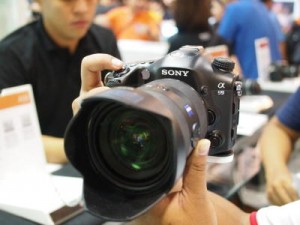By JASON LIOH
alltherage@thestar.com.my

I HAD a tough time buying my first DSLR five years ago. I spent weeks researching, reading online reviews and asking for opinions from experienced photographers before I finally splurged RM7,000 on my gear.
Buying a new camera is no easy feat these days. There are simply too many brands, types and models out there and the amount of information is enough to overload a computer, let alone a person.
In fact, I have been asked questions like “Is this a good camera?”, “What camera should I buy?” and “Which camera is the best?” so many times I have lost count.
If you intend to buy a camera, you must first identify the purpose of purchasing it. Is it going to be a “family camera” which will be used only during vacations, or is it going to be a money-making tool for you?
Are you interested in photography and willing to learn the technical aspects of it, or are you looking for a camera that gets the job done – or maybe even both?
Now that you have identified its purpose, you must come up with a practical budget as this will help you decide on the type of camera you can afford; be it a compact, semi-professional compact, mirror-less or DSLR (that comes in three different categories, beginner, semi-professional and professional).
At the moment, a compact camera starts at around RM400. A semi-professional compact goes for around RM1400, a mirrorless camera from RM2500, and DSLR from RM3000 onwards. Of course, these are merely rough estimations. Pricing can vary between dealers, brands and models.
There are many brands in the market right now; Canon, Nikon, Olympus, Sony, Pentax and Panasonic, just to name a few. Choosing one to “swear” your allegiance to will be a tough decision.
(Honestly, I believe each brand is just as good as the next.)
After narrowing down the list of cameras within your budget, the next step is to thoroughly inspect the photographs taken by these cameras. It is advisable to check the images on a computer screen instead of just looking at them on the camera.
The next time you’re at a camera shop, use your own SD or CF cards to test out the cameras as you can later inspect these images on your own computers. Scrutinise the images and their quality and then choose the one that you like most.
Each brand has its own colours, colour correction and white balance profiles, sharpness and many other qualities that set them apart. Pick the one that suits your preferences.
It is important that you decide which camera is the best for you by looking at the image quality of the sample photos (taken yourself, preferably) and viewed on your own monitor.
Now that you have decided which brand you prefer, it is time to choose which model to get.
Sometimes, your budget may allow you to choose from two different models of the same range.
To make things simpler, choose the one that is more expensive. The general idea is that the expensive one has more features (and maybe better specifications) than its cheaper counterpart.
While you might not need the extra features (such as GPS and WiFi), it is better to have them instead of regretting your decision later. This new camera will be with you for many years anyway and I don’t see the harm in investing in a slightly better one.
It is also important that you have a “feel” of these cameras in your hands. The cameras might be too big or small, too light or too heavy.
This is particularly important with compact cameras as they come in a variety of shapes and sizes, and they all have their buttons placed
differently. Choose one that you really feel comfortable with.
While the shape of DSLRs are pretty much standard, the weight and button placement could still be an important deciding factor.
Of course, these are just really general tips to help you narrow down your search, especially when it comes to compact cameras.
There are other more specific factors to be considered, such as sensor size, ISO performance, auto-focusing speed, the variety (and interchangeability) of lenses, etc., but they are only applicable for the more advanced DSLRs, something which I will be writing about next month.
The writer spent weeks researching and reading about his first DSLR, only to realise that the research didn’t matter. It was love at first touch. You can tweet him at @jasonmumbles or visit his blog at jasonmumbles.com.

Tell us what you think!